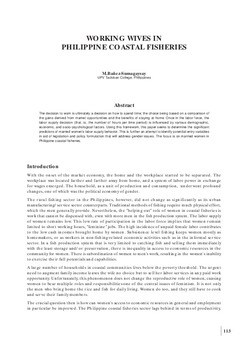Please use this identifier to cite or link to this item:
https://hdl.handle.net/20.500.12348/2244
Working wives in Philippine coastal fisheries
| dc.creator | Banez-Sumagaysay, M. | |
| dc.date.accessioned | 2019-01-09T20:29:11Z | |
| dc.date.available | 2019-01-09T20:29:11Z | |
| dc.date.issued | 2002 | |
| dc.identifier | wifg_asia_working_wives.pdf | |
| dc.identifier.citation | Global Symposium on Women in Fisheries: Sixth Asian Fisheries Forum, 29 November 2001, Kaohsiung, Taiwan | |
| dc.identifier.uri | https://hdl.handle.net/20.500.12348/2244 | |
| dc.description.abstract | The decision to work is ultimately a decision on how to spend time; the choice being based on a comparison of the gains derived from market opportunities and the benefits of staying at home. Once in the labor force, the labor supply decision (that, is, the number of hours per time period) is influenced by various demographic, economic, and socio-psychological factors. Using this framework, this paper seeks to determine the significant predictors of married women's labor supply behavior. This is further an attempt to identify potential entry variables in aid of legislation and policy formulation that will address gender issues. The focus is on married women in Philippine coastal fisheries. | |
| dc.format | application/pdf | |
| dc.language | En | |
| dc.publisher | WorldFish | |
| dc.rights | CC BY 4.0 | |
| dc.source | Global Symposium on Women in Fisheries | |
| dc.title | Working wives in Philippine coastal fisheries | |
| dc.type | Conference Paper | |
| dcterms.bibliographicCitation | Banez-Sumagaysay, M. (2002). Working wives in Philippine coastal fisheries. Global Symposium on Women in Fisheries: Sixth Asian Fisheries Forum, 29 November 2001, Kaohsiung, Taiwan | |
| cg.coverage.country | Philippines | |
| cg.identifier.worldfish | 472 | |
| cg.subject.agrovoc | coastal fisheries | |
| cg.subject.agrovoc | fisheries | |
| cg.subject.agrovoc | gender | |
| cg.contributor.affiliation | WorldFish | |
| cg.identifier.status | Open access | |
| cg.description.theme | Gender | |
| worldfish.location.area | Asia |
Files in this item
This item appears in the following Collection(s)
-
Gender [323]
